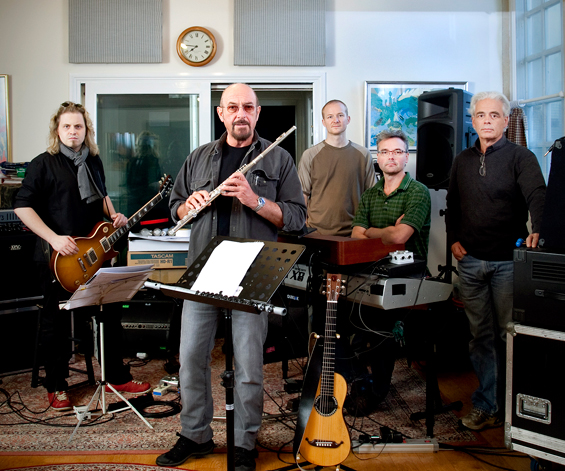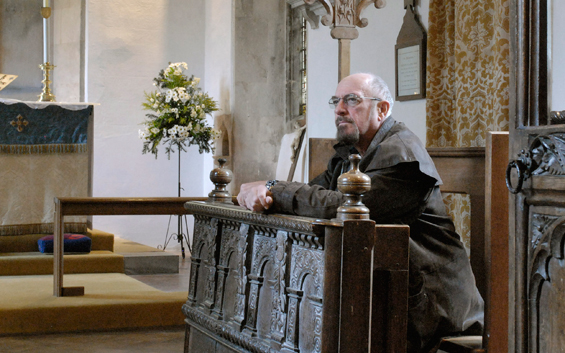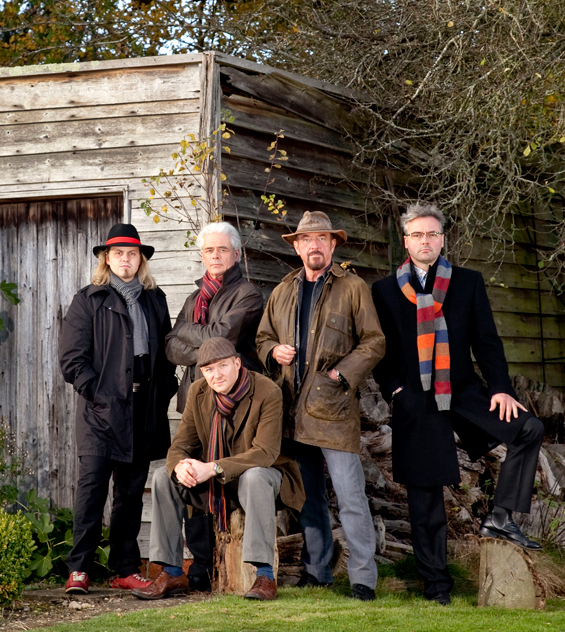

(l to r) Florian Ophale, Ian Anderson, Scott Hammond, John O'Hara, and David Goodier
TEN QUESTIONS WITH JETHRO TULL'S IAN ANDERSON
What can one possibly say by way of introduction to Jethro Tull? When the day comes that the history of rock music and more specifically progressive rock music is written, rest assured that Jethro Tull will figure prominently. Era-defining albums such as Aqualung, Thick As A Brick, and A Passion Play ensure that the group will long be remembered after band-leader Ian Anderson lays down his flute. But that day doesn't appear as if it's arriving any time soon, as Anderson and company have just released TAAB2 (Thick As A Brick 2), a perfectly credible sequel to the 1972 original (read the textura review here). Much has changed, naturally, since the old days: Anderson's long locks are gone, and there are two band configurations, not one, to speak of: the Ian Anderson touring band (shown above) and Jethro Tull proper (wherein long-time guitarist Martin Barre and drummer Doanne Perry replace Florian Ophale and Scott Hammond, respectively). But so long as the leader's voice and flute are present, the Tull sound remains intact. Needless to say, we are thrilled and honoured to be able to include an interview with the man himself in this month's issue.
1. Some would see the very idea of doing a sequel to Thick As A Brick as an act of madness, akin to Pink Floyd doing a Dark Side of the Moon II. How were you able to allay any trepidation you might have had about following up such a classic work?
I have much trepidation, as you might expect, but so did Neil Armstrong and Buzz Aldrin when they stepped on to the surface of the moon in 1969. Was it cheese? Was it dust? However, it is safe to assume they enjoyed the experience and, in the same way, so did I making the album and preparing to take it out on the road alongside the original Thick As A Brick.
2. Having read how you gradually reached the decision to answer the question “Whatever happened to Gerald Bostock?” (the exchange you had with ex-Gentle Giant member Derek Shulman, for instance), it's apparent that the sequel idea came about naturally, even serendiptously, one could say. However, there'll no doubt be cynics who'll claim that the idea is a crass ploy to bring attention to a band whose prime years are behind them. What would you say to that cynical view—or, at this stage, could you care less?
I only ever speak the truth. So cynics, be damned! Let an old man have his fun... especially while he still has his own teeth. And, they can still bite.
3. In fashioning Thick As A Brick II, did you consciously set out to re-integrate themes from the original or did you want to wipe the slate clean, musically speaking, and have the connection between the two parts be purely thematic and lyrics-based?
I wanted to use the same sound palette, for sure. The Fender Jazz Bass, the Gibson Les Paul Guitar, the Hammond Organ. The Glockenspiel, dammit. But the six or eight places where I give a little cross-reference, musically-speaking, are important too. Just enough of them; not too many.
4. Were you at all concerned about replicating on the new album the band sound of the original, given that the configuration at the time—Martin Barre, John Evans, Jeffrey Hammond, and Barriemore Barlow—produced such a definitive and beloved rendering of the original album material?
My current musicians, except one, have all been playing with me for ten years and can grasp the nuances of the original styles as well as put their own individual contributions into the music. John O'Hara was really pleased to meet John Evans last year in Australia and put a face and personality to the piano and keyboard work which he would have to emulate and almost replicate in some passages. Sad that John Evans no longer plays due to physical injury.

5. It's hard not to see Jethro Tull as survivors, and it's amazing that in 2012 you're still issuing new material and touring extensively, especially when so many of the Progressive rock bands from the early stage in your career are no longer active. What's the secret to your creative longevity?
Some people hang a sign over their porch, “Gone fishing,” whereas I have a sign that says “Gone playing.” It's what I do. Hard to imagine retirement or a scaling down of effort and reward from such a lifestyle. Would you want to retire? Not while the creative juices are running down your leg!
6. One way bands of long-standing adapt is to latch on to a current trends and try to stay ‘relevant' by mutating into something they're not. How is it that Jethro Tull has been able to remain true to its sound (I don't recall hearing about Tull going through a ‘punk' phase, for example) and not succumb to the temptation to change its sound to make it more ‘current'?
Well, it's all about trying things out preferably before they become too current and trying to move with the creative whim outside the realms of what is ‘new.' Not trying to latch on to a new musical movement and mix it gratuitously with the the young and trendy. I am a confirmed loner and don't really follow fashion. I don't actually have either the waistline or the white-and-even teeth for it.
7. The idea of pondering where Gerald Bostock's life might have taken him by the age of fifty obviously provided you with a natural wellspring of material to explore in the sequel. I'm wondering if you've considered following up A Passion Play in like manner, especially when A Passion Play, like Thick As A Brick, represents such a peak moment in Tull's discography.
Definitely NOT A Passion Play. Not one of my finest moments and too complicated and dense, musically-speaking. I don't see a sequel in that. My next projects are set in stone anyway and will keep me busy in 2013 and 2014.
8. At the Jethro Tull site, you state, “The era of professional media Prog-bashing seems to have given way to a more appreciative appraisal of the genre and newer bands such as Dream Theater, Porcupine Tree, and Spock's Beard have possibly prompted a new and younger audience to re-examine the seventies originators' seminal albums too.” Why do you think Prog-rock received such a hyperbolic bashing when a good number of incredible albums—King Crimson's Starless & Bible Black comes to mind as a representative example—came out of it?
Too pretentious and self-indulgent and while the original Thick As A Brick spoofed the genre, others had to use more destructive means to retaliate against the evil genre! But there were lots of good and satisfying moments in even the most anal of Prog efforts. Yes, ELP, and Genesis have proved that, even if it wasn't all to my particular taste. I think that a new generation of Prog fans really does exist and the can place the work of the originators happily alongside the likes of Opeth, Dream Theatre and so on.
9. It's been interesting to see that in recent electronic music-making there's been a significant revival of interest in analogue synthesizer music, with a figure such as Oneohtrix Point Never issuing new music that's not terribly unlike the music Tangerine Dream and like bands created in the ‘70s. That leads me to wonder what you're listening to these days, if anything.
The sound of wind, rain and cats miaowing. And Seth Lakeman, Slipknot, and Opeth. A little bit of Mozart and Beethoven, too. A R Rahman from London/Mumbai and Varttina from Finland.
10. The new album ends with “What-ifs, Maybes, and Might-have-beens.” Like anyone of a certain age, you can't help but have asked yourself the same questions. What, then, would be among your own “What-ifs, Maybes, and Might-have-beens?”
Having a different name for the band! I never liked the name Jethro Tull but it was too late to change after Feb 11th 1968 when we got a residency at the Marquee Club in London. That was what we happened to have been called that week....

May 2012![]()